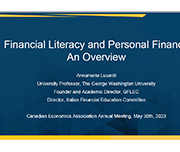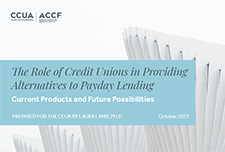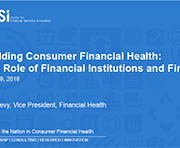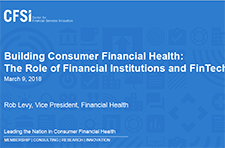The Role of Credit Unions in Providing Alternatives to Payday Lending
Emerging Technology for All: Conversational AI’s Pivotal Role
This infographic is a preview of Commonwealth's research survey of 1290 lower-and moderate-income people to understand their perceptions, needs, and uses of conversational AI.
Credit Characteristics, Credit Engagement Tools, and Financial Well-Being
This report presents results from a joint research study between the Consumer Financial Protection Bureau (CFPB) and Credit Karma. The purpose of the study is to examine how consumers’ subjective financial well-being relates to objective measures of consumers’ financial health, specifically, consumers’ credit report characteristics. The study also seeks to relate consumers’ subjective financial well-being to consumers’ engagement with financial information through educational tools.
Resources
Talking to our neighbours: America’s household balance sheets
Household Financial Stability and Income Volatility, Ray Boshara, Federal Reserve Bank of St. Louis
Income volatility: What banking data can tell us, if we ask, Fiona Greig, JP Morgan Chase Institute
Up Close and Personal: Findings from the U.S. Financial Diaries, Rob Levy, CFSI
The good, the bad, and the ugly: Canada’s household balance sheets
Canada’s household balance sheets, Andrew Heisz, Statistics Canada
Income volatility and its effects in Canada: What do we know?
Pervasive and Profound: The impact of income volatility on Canadians, Derek Burleton, TD Economics
Income and Expense Volatility Survey Results, Patrick Ens, Capital One
Neighbourhood Financial Health Index: Making the Invisible Visible, Katherine Scott, Canadian Council on Social Development
What gets inspected, gets respected: Do we have the data we need to tackle household financial instability?
Do we have the data we need to tackle household financial instability?, Catherine Van Rompaey, Statistics Canada
Emerging solutions
Income volatility: Strategies for helping families reduce or manage it, David S. Mitchell, Aspen Intitute
Building consumer financial health: The role of financial institutions and FinTech, Rob Levy, CFSI
Redesigning Social Policy for the 21st Century, Sunil Johal, Mowat Centre
Strengthening retirement security for low- and moderate-income workers, Johnathan Weisstub, Common Wealth
Building consumer financial health: The role of financial institutions and FinTech
In this video presentation Rob Levy from the Center for Financial Services Innovation (CFSI) examines the role of financial institutions in building consumer financial health. This presentation was given at the Prosper Canada Policy Research Symposium on March 9, 2018. Read the slide deck that accompanies this presentation. Pour lire les diapositives de la présentation, cliquez ici. View the full video playlist of all presentations from this symposium.
Using Design to Deepen Relationships in the Financial Sector
This publication reveals the outcomes of Bridgable's work with a federal credit union, cutting through their overwhelming number of offerings to better engage with their low-income members. It also discusses why agility is a better bet than digitization when it comes to our changing financial ecosystem. Finally, it will break down their approach to one of the most popular design methods today, the design sprint, and how it can produce results while also lowering risk. Note: This link will allow you to download the document from the Bridgeable website.













